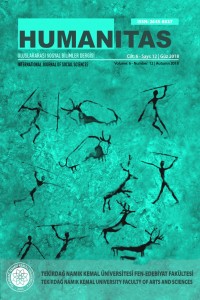Orta Ergenlik Dönemindeki Öğrencilerin Benlik Algılarının Mükemmeliyetçilik Düzeylerini Yordama Gücü
Öz
Bu araştırmanın amacı, orta ergenlik dönemindeki öğrencilerin benlik algılarının mükemmeliyetçilik düzeylerini yordayıcılığını incelemektir. Araştırma ilişkisel tarama modeline göre tasarlanmıştır. Araştırma kapsamında öğrencilerin benlik algısı ve mükemmeliyetçilik düzeyleri çeşitli kişisel özellikler açısından da incelenmiştir. Araştırmada benlik algılarını ölçmek amacıyla Öner (1986) tarafından Türkçe’ye uyarlanan Piers-Harris’in Çocuklarda Öz Kavramı Ölçeği, mükemmeliyetçilik düzeylerini ölçmek amacıyla da Kırdök (2004)’ün geliştirdiği Olumlu Olumsuz Mükemmeliyetçilik Ölçeği kullanılmıştır. Araştırmanın evrenini, Tekirdağ'daki ortaokullarda öğrenim gören orta ergenlik dönemindeki öğrenciler oluşturmaktadır. Araştırmanın örneklemini ise Tekirdağ'da yer alan ortaokullar arasında seçkisiz küme örnekleme yöntemiyle belirlenmiş 12 ortaokulda okuyan 609 orta ergenlik dönemindeki öğrenci oluşturmuştur. Çalışmanın sonunda benlik algısı puanlarının mükemmeliyetçilik puanlarını anlamlı şekilde yordadığı, benlik algısı mutluluk alt ölçeği cinsiyete, rehberlik hizmetlerinden destek alma değişkenine göre anlamlı şekilde farklılaştığı saptanmıştır. Olumlu-olumsuz mükemmeliyetçilik alt ölçeklerinde ise değişkenlerin hiçbirinin anlamlı bir farklılık olmadığı görülmüştür.
Öz
The aim of his research to determine the predictive power of self-concept on perfectionism levels of the middle adolescence period's students. In this study correlational design was used. Within the scope of the research, self-perception and perfectionism levels of the students were examined in terms of various personal characteristics. To measure children’s self-concept levels, Piers-Harris Children’s Self Concept scale were used. And to measure children’s perfectionism levels, Positive and Negative Perfectionism Scale was used. The population of the study is students who are in the middle adolescence period in Tekirdağ. In this study randomly cluster sampling method was used. The sample was comprised of 12 schools which are located in Tekirdağ. Overall, 609 students were included to study. At the end of the study, it was found that the self-perception scores significantly predicted the perfectionism scores, and the self-perception happiness subscale differed significantly between gender groups, and taking support from guidance services variable. In the positive-negative perfectionism subscales, there is no significant differences in demographic variables.
Ayrıntılar
| Birincil Dil | Türkçe |
|---|---|
| Bölüm | Araştırma Makalesi |
| Yazarlar | |
| Yayımlanma Tarihi | 22 Ekim 2018 |
| Yayımlandığı Sayı | Yıl 2018 Cilt: 6 Sayı: 12 |
Cited By
ERGENLERİN SOSYAL GÖRÜNÜŞ KAYGISI DÜZEYLERİNİN YALNIZLIK DÜZEYLERİNE ETKİSİNİN İNCELENMESİ
Uluslararası Türk Kültür Coğrafyasında Sosyal Bilimler Dergisi
https://doi.org/10.55107/turksosbilder.1106924
EXAMINING THE RELATIONSHIP BETWEEN THE CHARACTERISTICS OF PERFECTIONISM AND THE INFERIORITY FEELING AMONG UNIVERSITY STUDENTS
Nişantaşı Üniversitesi Sosyal Bilimler Dergisi
https://doi.org/10.52122/nisantasisbd.1165422








